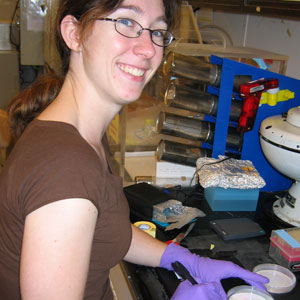 |
| Jessica Pearson of biochemistry |
From the open ocean to the familiar surroundings of a science lab, students in the Science Co-op program are always working. Here, students gain work experience in the sciences while fulfilling requirements for their degrees. It is a far cry from the drudgery often associated with summer jobs, as there is always intriguing research and experimentation to be done.
In the field of marine biology, new studies and experiments are always being conducted. Danielle Knip, who is working towards her honours degree, helps grad students with fieldwork by running boats and changing oxygen tanks, as well as learning to dive. She is keenly interested in marine biology, and has turned employment into an honours degree. Her main project this summer is the study of unusual sea urchin and starfish movement near Splitnose Point. She will soon begin her thesis on the metabolism of sea urchins.
Of course, much of the work is done in the lab. Caitlin Gerber, majoring in marine biology, does mainly lab work. Her project involves a type of zooplankton called a pteropod. She aims sound waves at the submerged pteropod in order to model it in a process analogous to sonar. Such models are used in the study of population distribution of plankton and in the study of marine food chains. Marine biology has always interested Caitlin. ÒI grew up on the ocean,” she says. ÒEnvironmental science was always what interested me.”
Microbiology, biochemistry and immunology research also figures highly in the Co-op program, from DNA research to cancer study. One student in particular, Marie LaFreniere, has received the Cancer Care Nova Scotia award to research cancer. She experiments with anti-cancer agents derived from natural sources, like cowÕs milk or turmeric spice, with intent to explore the possibility of finding less harmful alternatives to chemotherapy. ÒIt fascinates me,” she says of her work. ÒI originally came to Dal for the Microbiology and Immunology programs.”
Jessica Pearson deals mainly with DNA and protein interactions. She is working to investigate the strange phenomenon of certain DNA plasmids in yeast cells segregating during cell division without any noticeable means of doing so. Her experiments constitute matching proteins and looking for possible interactions (expressed as colours) that give clues to mapping the structure of proteins involved in this strange process.
Stewart Delo is a student volunteer with AVæ„¿÷≤ø News for the summer. He is entering the University of King's College journalism program in the fall.
